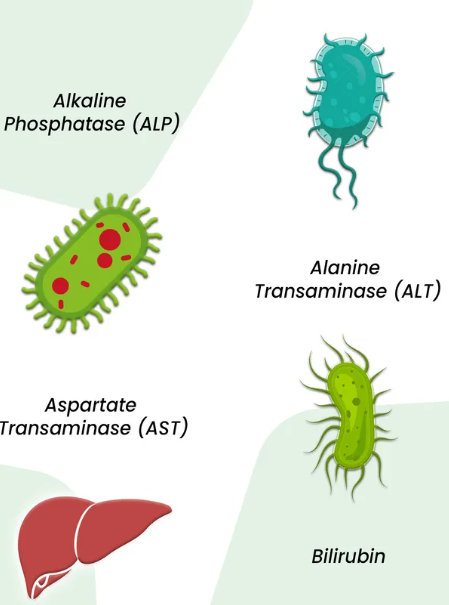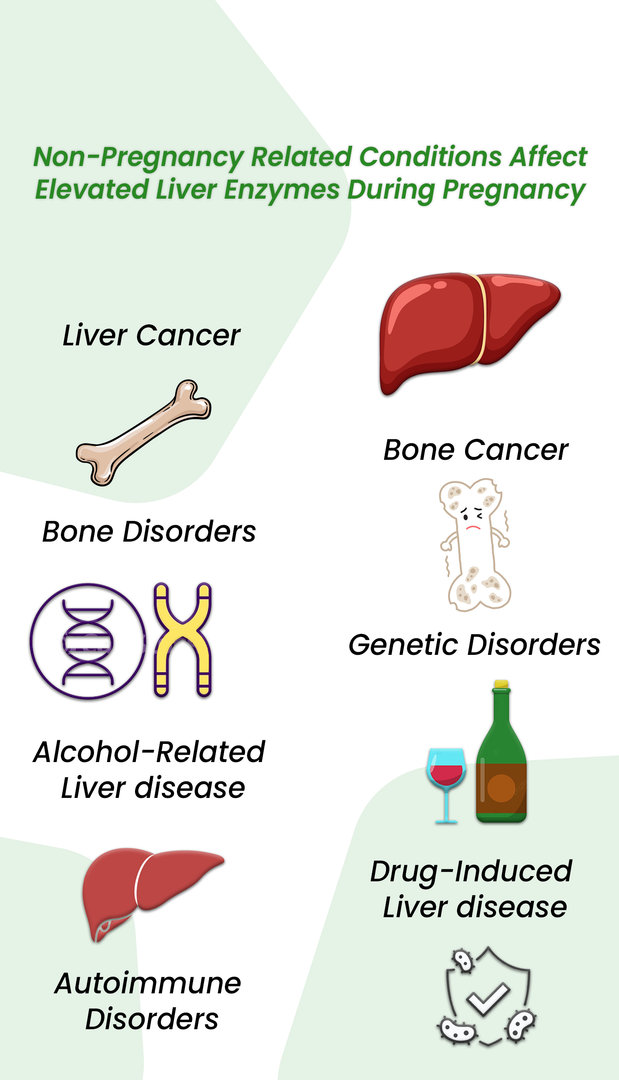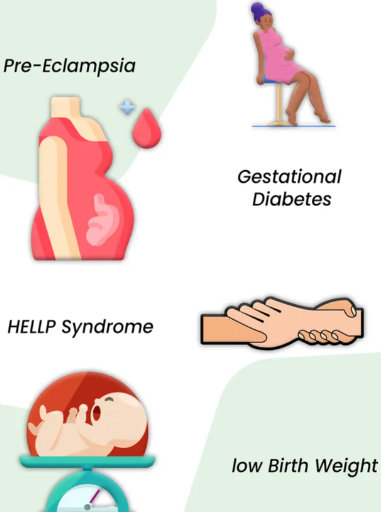Overview
Pregnancy brings about numerous physiological changes, and while most are routine, some can raise concerns. One such concern is elevated liver enzymes in pregnancy. This condition affects a significant number of pregnant women worldwide and can be an indicator of underlying liver dysfunction or other health issues. Globally, liver enzyme abnormalities are observed in approximately 3-5% of pregnancies, with varying prevalence across different regions. In India, studies have reported that about 5-7% of pregnant women experience elevated liver enzymes, often necessitating further investigation to rule out serious complications.
Understanding Elevated Liver Enzymes in Pregnancy
Elevated liver enzymes can be detected through routine blood tests during pregnancy. The liver enzymes typically measured include ALT, AST, alkaline phosphatase (ALP), and gamma-glutamyl transferase (GGT). While slight elevations can be normal due to the physiological changes during pregnancy, significant elevations require attention. Understanding the causes, implications, and management of elevated liver enzymes is crucial for expectant mothers and healthcare providers.
According to Dr. Gaurav Gupta a surgical gastroenterologist, Mumbai, said, "It could stem from conditions specific to pregnancy itself. These include intrahepatic cholestasis of pregnancy, where bile flow in the liver is affected, and HELLP syndrome, a severe complication involving liver function. Sometimes, existing liver issues or infections like hepatitis can also lead to elevated enzyme levels during pregnancy. Regular monitoring and proper management are crucial to safeguarding the health of both the mother and the fetus."
Stay with us and read further. Here, we have discussed why elevated liver enzymes occur during pregnancy, symptoms, and treatment options. Let's learn whether it's normal and what it means for you and your baby.
Are you worried? Don't worry; keep going for your regular pregnancy check-up with your gynaecologist. If anything is concerning, they will guide you on the next course of action.
Is elevated liver enzymes normal in pregnancy?
Elevated liver enzymes during pregnancy can be indicative of underlying liver problems, such as hepatitis, liver pain, back pain, cirrhosis, cholestasis, and other health conditions. It is important to note that elevated liver enzymes are not considered normal during pregnancy.
Some common causes of elevated liver enzymes in pregnancy include:
Pre-eclampsia: A pregnancy-related condition characterized by high blood pressure and protein in the urine.
HELLP syndrome: A severe form of pre-eclampsia that can cause liver damage.
Gestational cholestasis (GC): Also known as cholestasis of pregnancy, GC is a condition that affects the liver's ability to metabolize bile properly.
Quick fact: Did you know that cholestasis can occur after childbirth as well? If you would like to know more about it, check out the blog Cholestasis after Pregnancy.
Gestational hypertension: High blood pressure during pregnancy.
Viral hepatitis: Viral infections such as hepatitis A, B, C, D, and E can cause liver enzyme elevation.
Did you know?
The specific enzymes that are measured can also affect the incidence of elevated liver enzymes in pregnancy. For example, the level of ALT is often used as an indicator of liver function. It was noted that high alkaline phosphatase levels during pregnancy could indicate bone diseases such as Paget's disease, rickets, and bone tumors.
Types of liver enzymes measured during pregnancy

These enzymes can evaluate liver function and detect potential issues, such as hepatitis or pre-eclampsia. It's important to note that the expected levels of these enzymes can vary during pregnancy. So they should be interpreted in the context of the individual patient and their specific medical history.
Causes of elevated liver enzymes when pregnant
As mentioned earlier, elevated liver enzymes during pregnancy can be caused by several pregnancy-related conditions and some other non-pregnancy-related conditions, including:

According to Evelina Sabonaityte Medical Doctor Giejo stated that -
"Genetics And Family History also Plays In Developing Elevated Liver Enzymes In Pregnancy. Elevated liver enzymes during pregnancy can be a sign of intrahepatic cholestasis of pregnancy (ICP). Genetics as well as family history can play a role in the development of ICP. Women with a family history of ICP are at an increased risk of developing ICP. It is important to note research on the matter is still ongoing."
Normal values of liver enzymes in pregnancy
The normal levels of liver enzymes during pregnancy can vary based on the enzyme being gauged and the laboratory performing the test. However, in general, the following ranges are considered to be expected to be normal for pregnant women:
| ALT levels | 5-40 units/liter |
| AST levels | 5-40 units/liter |
| ALP levels | 30-120 units/liter |
| GGT levels | 5-35 units/liter |
| Bilirubin Levels | 0.2-1.2 mg/dl |
Note: Please remember that these ranges can be affected by the gestational age of the pregnancy. For better treatment, it is best to discuss any concerns about your liver enzyme levels with your obstetrician or a liver disease specialist at the best hospital.
Chances of liver enzymes increasing in pregnancy
The chances of liver enzymes going high during pregnancy vary depending on the specific enzyme and the underlying cause of the elevation.
Condition | Affected pregnancies | Symptoms |
| Cholestasis of pregnancy | About 1 in 140 pregnancies | Liver unable to properly metabolize bile |
| Pre-eclampsia | 3-5% of pregnancies | High blood pressure and protein in the urine |
| HELLP syndrome | 1 in 2,000 pregnancies | Liver damage |
| Gestational hypertension | 5-8% of pregnancies | High blood pressure |
Viral hepatitis is not common during pregnancy, except in pregnant women who have a high risk of hepatitis, including those who have a history of:
- travel to countries with high hepatitis prevalence
- blood transfusion
- drug abuse
Please note that elevated liver enzymes during pregnancy may not cause any noticeable symptoms. However, in some cases, women may experience symptoms such as:
- Fatigue
- Weakness
- Loss of appetite
- Nausea
- Jaundice (yellowing of the skin and eyes).
Other conditions can also cause these symptoms, so it's essential to consult with a doctor for an accurate diagnosis and management. Additional tests and monitoring may be required if symptoms are severe or if there are signs of liver dysfunction.
Are you pregnant, and did you notice any such symptoms? Don't panic; rather, book your appointment with the best gynecologist without delay and make the best treatment choices for your and your baby's health!
Treatment for elevated liver enzymes in pregnancy
Treatment for elevated liver enzymes during pregnancy depends on the underlying cause of the elevation. Some common treatments include:
Condition | Treatment |
Cholestasis of pregnancy | Ursodeoxycholic acid - a medication that helps to reduce the symptoms of itching and improve the flow of bile |
Pre-eclampsia | Close monitoring of blood pressure, protein in the urine, and liver enzymes |
HELLP syndrome | Close monitoring of blood pressure, protein in the urine, and liver enzymes |
Gestational hypertension | Close monitoring of blood pressure and liver enzymes. May include medications to lower blood pressure |
Viral hepatitis | Antiviral therapy can be effective in preventing the progression of liver disease and reducing the risk of maternal and fetal complications. |
Treatment for other non-pregnancy-related causes of elevated liver enzymes will depend on the underlying condition.
What happens if elevated liver enzymes are not treated during pregnancy?
If elevated liver enzymes are not treated during pregnancy, it can lead to potential complications for both the mother and the baby. Elevated liver enzymes can indicate liver dysfunction or damage, leading to further damage if left untreated. This can result in conditions such as:

Note: HELLP syndrome (a severe complication of pregnancy indicated by Hemolysis, Elevated Liver enzymes, and Low Platelet count)
Hence, it is essential to consult your doctor to determine the cause of the elevated enzymes and develop a treatment plan. Depending on the cause, treatment may involve changes in medication, lifestyle, or close monitoring during pregnancy.
Tips to lower the risk
- Maintaining a healthy lifestyle is eating a well-balanced diet, exercising regularly, and avoiding alcohol and tobacco.
- Managing any pre-existing medical conditions that can increase the risk of liver dysfunction, such as diabetes and obesity.
- Avoid certain medications, such as non-steroidal anti-inflammatory drugs (NSAIDs), that can cause liver enzyme elevations.
- Getting vaccinated against hepatitis A and B can reduce the risk of viral hepatitis.
In some cases, the cause of elevated liver enzymes during pregnancy may be unknown and cannot be avoided. Therefore, you must consult your doctor for regular check-ups and pregnancy monitoring to minimize potential risks.
Elevated levels of liver enzymes can be a sign of liver damage or disease. If you have concerns about your liver enzymes during pregnancy, discussing them with your obstetrician or hepatologist is best. They can help determine the cause of the elevation and recommend the appropriate treatment.
If you have more questions, don’t worry. We are here to help you!
FAQs
1. What does it mean when your liver enzymes are high during pregnancy?
Elevated liver enzymes during pregnancy can indicate liver inflammation or damage. It may be a sign of conditions like ICP, preeclampsia, or HELLP syndrome, which require medical attention.
2. When should I worry about ALT levels in pregnancy?
If ALT levels are significantly elevated, especially if accompanied by symptoms like itching, abdominal pain, or high blood pressure, these could indicate a severe condition like ICP or preeclampsia.
3. What causes high liver enzymes during pregnancy?
Causes include conditions like ICP, preeclampsia, HELLP syndrome, viral hepatitis, gallbladder disease, and the use of certain medications.
4. How are elevated liver enzymes treated during pregnancy?
Treatment depends on the cause. It may include medications, dietary changes, and close monitoring. In severe cases, early delivery may be necessary.
5. Are elevated liver enzymes dangerous in pregnancy?
Elevated liver enzymes can be dangerous if they indicate a serious condition like preeclampsia or HELLP syndrome. Early detection and management are crucial.
6. What is the role of the LFT test in pregnancy?
LFT (Liver Function Test) measures liver enzymes and other markers of liver health. It is used to monitor liver function during pregnancy, especially in women at risk of liver complications.
7. Can elevated liver enzymes affect the baby?
Yes, if the elevation is due to conditions like ICP or preeclampsia, it can lead to complications such as preterm birth or fetal distress.
8. Can elevated liver enzymes occur post-pregnancy?
Yes, some women may continue to have elevated liver enzymes after delivery, especially if they have conditions like HELLP syndrome. Postpartum monitoring is important.
References:
https://www.frontiersin.org/articles/10.3389/fcvm.2022.963957/full






